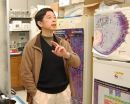(Press-News.org) CHAPEL HILL, N.C. – Scientists around the world have been hot on the trail of a genetic mutation closely associated with some brain cancers and leukemia since the mutation's discovery in 2008. The hunt is now yielding fruit. In the Jan. 18, 2011 issue of Cancer Cell, researchers reveal how the mutation contributes to cancer development and suggest potential ways to counter its effects.
About 75 percent of people with low-grade brain tumors and 20 percent of people with acute myeloid leukemia have a mutated version of a gene known as IDH. IDH helps cells metabolize, or eat, food. "We now know that IDH represents the most frequently mutated metabolic gene in human cancer. And that changes the landscape of cancer research in metabolism quite a lot," said Yue Xiong, PhD, William R. Kenan Jr. professor of biochemistry and biophysics at the UNC Lineberger Comprehensive Cancer Center.
Xiong and collaborators at UNC, the University of California San Diego, and the Shanghai Medical College of Fudan University in China discovered that the IDH mutation sets off a battle inside cells between two metabolites, small molecules produced by metabolic enzymes. On the good side—the side that leads to normal cell growth—is a molecule called ?-KG. On the bad side—the side that leads to cancer—is a molecule called 2-HG.
The researchers discovered that cells with the IDH mutation produce less ?-KG and more 2-HG than normal cells. 2-HG then outcompetes ?-KG, disabling a whole family of enzymes that depend on ?-KG to do their jobs in the cell. Normal cell functions break down, contributing to the development of cancer.
Two of the affected enzymes are also involved in controlling gene expression, so if 2-HG wins the battle, it can also activate other genes that lead to cancer growth.
Bolstering ?-KG to help fight 2-HG could offer a new treatment option for patients with the mutation. "?-KG is a natural product of the body. So we know we can survive it, we know it's not toxic. That gives us a window of opportunity," said Xiong.
"In terms of future therapeutic interventions for IDH-mutated tumors, there are two directions we could go," Xiong said. "One is developing a drug that inhibits the ability of the mutant enzyme from producing 2-HG. Another is to somehow provide ?-KG back to the patients with mutated IDH to battle 2-HG."
Such therapies would help only those cancer patients with IDH mutations. "We no longer believe there will be a single silver bullet, a drug to treat and cure all types of cancers," Xiong said. "Instead, we are looking into the therapeutic treatment of individual types of cancer. Therefore, a specific agent that is targeting a very specific event such as tumor with mutated IDH now becomes much more valuable."
In 2010, more than 13,000 people died from brain and other nervous system cancers, and more than 20,000 died from leukemia. A drug that helps even a portion of patients with these cancers can still affect a lot of people, said Xiong.
INFORMATION:
Research collaborators included Yi Zhang, Kenan distinguished professor of biochemistry and biophysics at UNC and an investigator of the Howard Hughes Medical Institute, Stephen Frye of the UNC Eshelman School of Pharmacy, Kun-Liang Guan of the University of California San Diego, and Shi-min Zhao and students at Shanghai Medical College of Fudan University.
Molecular battle in cancer cells offers clues for treatment
2011-01-20
ELSE PRESS RELEASES FROM THIS DATE:
Pitt study: End-of-life decisions take longer if patient hasn't shared wishes with family
2011-01-20
PITTSBURGH, Jan. 18 – Family caregivers who had not discussed life support measures with critically ill patients took nearly two weeks longer to decide to forego further medical intervention than those who had prior conversations about the issues, according to researchers from the University of Pittsburgh School of Medicine and the Graduate School of Public Health. They share their findings in a poster presentation at the Society of Critical Care Medicine congress this week in San Diego.
Also, a patient's loved ones were more confident about acting as surrogate decision-makers ...
Girls who are bullied are at risk for substance use through depression
2011-01-20
Washington, DC, January 19, 2011— Both boys and girls who are victims of bullying, including bullying through e-mail and the internet, are at elevated risk for depression. However, according to a new study, adolescent girls may engage in substance use as a result of bullying-related depression,.
As schools reopen following the holidays, the message to parents of adolescent girls is that bullying can have serious consequences:"If your daughter is a victim of bullying, take it seriously, do all possible to prevent recurrence, and attend to possible depression and substance ...
A mathematical model for moving bottlenecks in road traffic
2011-01-20
Serious traffic gridlocks, like the jam on Beijing's national expressway a few months ago which brought vehicles to a halt for days, are a real-world issue needing attention. Unfortunately, such standstills are not uncommon in Beijing, or in other cities around the world.
Such incidents motivate the analysis of traffic to minimize similar events and provide insight into road design and construction, such as where to install traffic lights and toll booths, how many lanes to build, and where to construct an overpass or a tunnel. The goals of these analyses are to relieve ...
Predicting political hotspots: Professors' global model forecasts civil unrest against governments
2011-01-20
MANHATTAN, Kan. -- The forecast for predicting the next political hotspots could be much more accurate because of a model developed by two Kansas State University professors and a colleague in New York.
The model, named the Predictive Societal Indicators of Radicalism Model of Domestic Political Violence Forecast, is currently five for five in predicting which countries will likely experience an escalation in domestic political violence against their governments within the next five years.
"So far it's been pretty accurate," said Sam Bell, assistant professor of political ...
Health-care systems not using best evidence in decision-making
2011-01-20
TORONTO, Ont., Jan. 19, 2011–Health care systems around the world are failing to use evidence obtained through research when making decisions, causing inefficiencies and reduced quantity and quality of life, according to a leading expert in the field of "knowledge translation."
"Failures to use research evidence to inform decision-making are apparent across all key decision-maker groups," said Dr. Sharon Straus, a geriatrician and director of knowledge translation at St. Michael's Hospital.
Dr. Straus was the guest editor of the January issue of the Journal of Clinical ...
Researchers discover giant crayfish species right under their noses
2011-01-20
CHAMPAIGN, Ill. —Two aquatic biologists have proven that you don't have to travel to exotic locales to search for unusual new species. They discovered a distinctive species of crayfish in Tennessee and Alabama that is at least twice the size of its competitors. Its closest genetic relative, once thought to be the only species in its genus and discovered in 1884 about 130 miles away in Kentucky, can grow almost as big as a lobster.
The researchers found their first specimen under one of the biggest rocks in the deepest part of a creek that has been a (literal) stomping ...
New Pediatrics study identifies the risks, consequences of video game addiction
2011-01-20
AMES, Iowa -- Parents may have good reason to be concerned about how much time their kids have been spending playing their new video games since the holidays. A new study by an international research team -- including an Iowa State University psychologist -- found further evidence that video game "addiction" exists globally and that greater amounts of gaming, lower social competence and greater impulsivity were risk factors for becoming pathological gamers.
The two-year longitudinal study of 3,034 third through eighth grade students in Singapore found approximately nine ...
Students are more likely to retake the SAT if their score ends with '90'
2011-01-20
High school students are more likely to retake the SAT if they score just below a round number, such as 1290, than if they score just above it. That's the conclusion of a study published in Psychological Science, a journal of the Association for Psychological Science, which found that round numbers are strong motivators.
The work was inspired by a study that found that a car's value drops suddenly when it passes a 10,000 mile mark—so a car that has 70,000 miles is worth markedly less than one with 69,900 miles. "We were talking about that and we started thinking about ...
Illinois income tax increase a missed opportunity for tax reform
2011-01-20
CHAMPAIGN, Ill. – Already under fire for raising taxes on individuals and businesses, the state Legislature missed a major opportunity to update the Illinois tax structure, says a University of Illinois law professor.
Richard L. Kaplan, an expert on taxation and retirement issues, says the state of Illinois has a seriously outmoded tax structure that's in dire need of reform.
"Tax reform is often very difficult because tax changes necessarily alter the burden of taxation, and some people end up paying more," he said. "That makes legislators hesitant to undertake the ...
MU research on teacher retirement systems timely for reform efforts
2011-01-20
A number of states are trying to deal with huge unfunded pension liabilities that threaten to absorb large shares of K-12 education budgets. Because this fiscal crisis may force policymakers to consider teacher retirement benefit system reform, the authors of a newly published journal issue suggest now is the opportune time to examine the consequences of these systems on school staffing and educator quality.
Michael Podgursky, a professor of economics in the University of Missouri College of Arts and Science, co-edited, with University of Arkansas Professor Robert Costrell, ...



